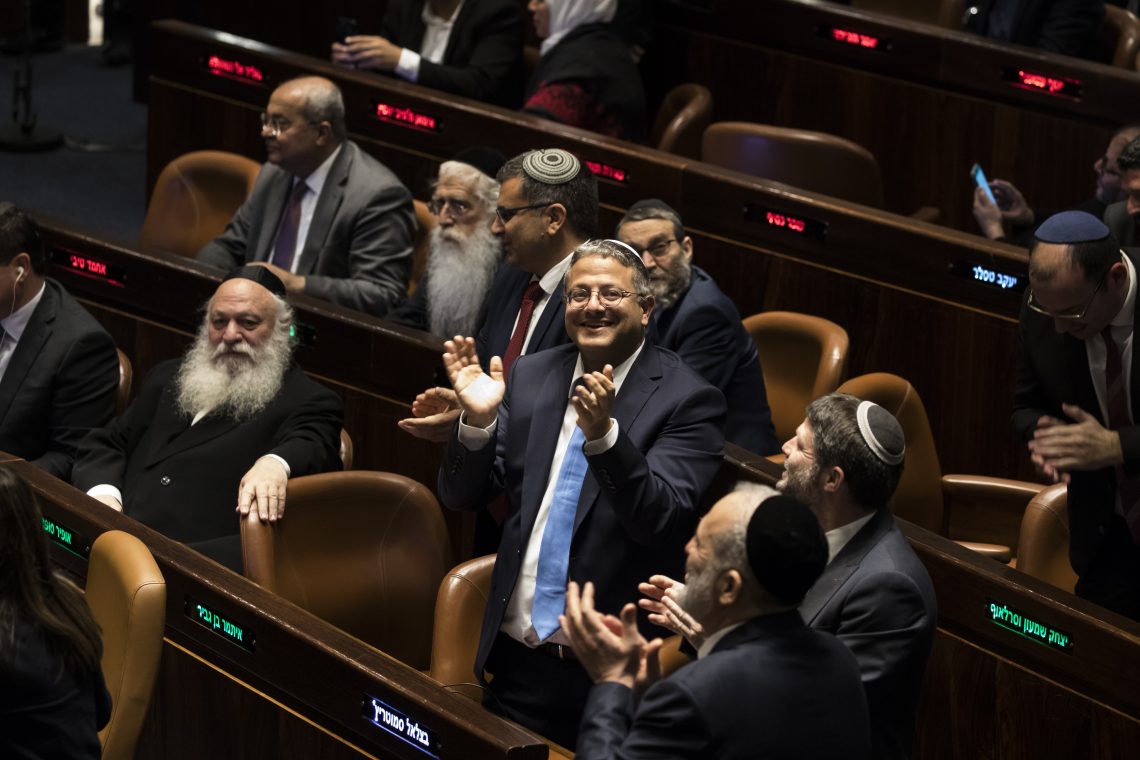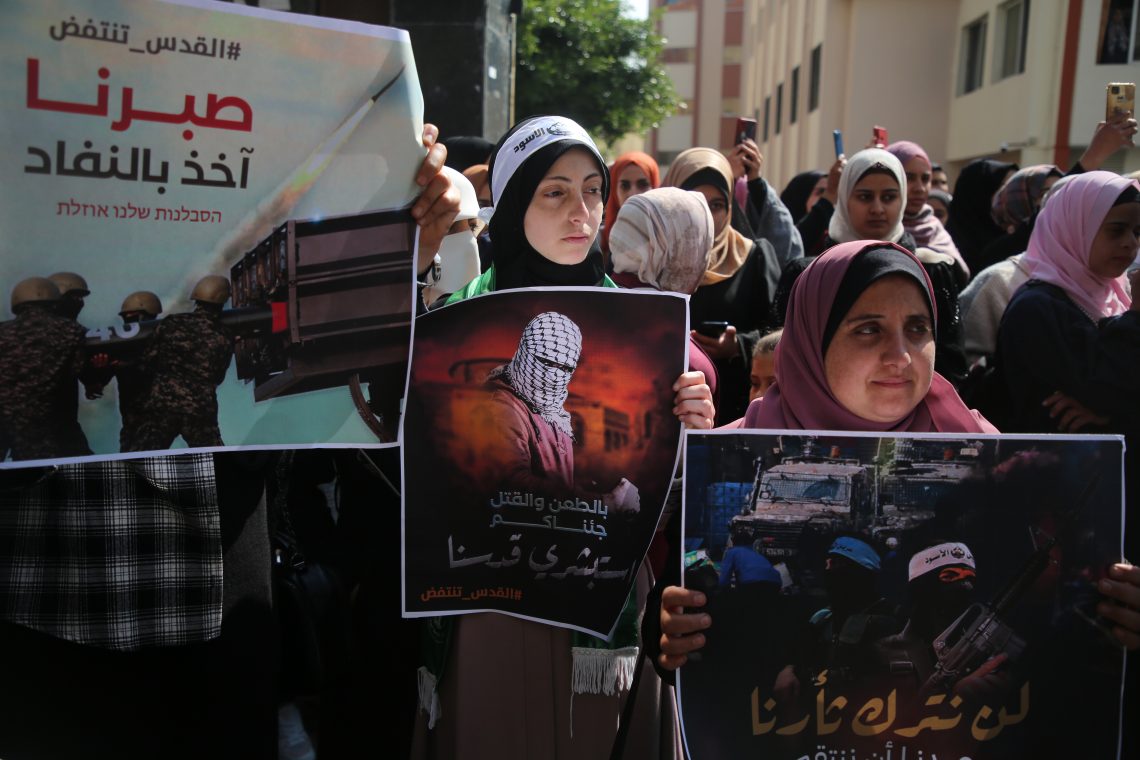Israeli election delivers new generations, new resentments
A nationalist lurch in Israel’s governing coalition ratchets up an already unstable situation, as tensions simmer in the Palestinian territories.

In a nutshell
- Israel’s new coalition has empowered ultranationalist forces
- The Palestinian public is disenchanted with the Palestinian Authority leadership
- Hamas may seize the moment to expand in influence in the West Bank
The history of the Middle East has long been marked by political figures who sought to embody the destiny of their nation. Former Israeli Prime Minister Golda Meir and the Palestinian leader Yasser Arafat were members of a generation that believed that the flag made the people. Today’s leaders, in contrast, want to make their nations, shaping them according to their theological and political beliefs.
The new Israeli government, which formed in late 2022 after elections in November, reflects this shift in values, one that is undermining the concept of national unity. Sitting with the conservative Likud party of Prime Minister Benjamin Netanyahu is an upstart generation of ultranationalist politicians – one less interested in integrating into a pluralist society than in strengthening their own autonomy and imposing Jewish religious law on the country.
These forces are led by Itamar Ben-Gvir (46 years old) and Bezalel Smotrich (42 years old), who have joined Mr. Netanyahu in government alongside two ascendant ultra-Orthodox parties, Shas and United Torah Judaism. What they share is a demand for an end to the “masquerade,” i.e. the peace process with the Palestinians, in order to pursue territorial conquests. As Israeli President Isaac Herzog has acknowledged, Israel is experiencing a “weakening of the sense of belonging to the country.”
Media characterizations of the new Israeli government as simply “far-right” are reductive. The latest coalition is part of a global phenomenon, one that is decidedly demographic. By 2050, one in four Israeli children will be born into a Haredi or ultra-Orthodox family, a group that includes many seeking to reshape the foundation of the Jewish state. There are growing calls to limit Israel’s Law of Return, which extends the right to immigration to anyone with a Jewish grandparent because the would-be migrants are insufficiently Jewish. Judaism abroad is accused of having “provoked assimilation,” according to Yitzhak Yosef, one of Israel’s chief rabbis, who would prefer the country to become an Orthodox state.
Many experts predicted outbreaks of instability in the Palestinian territories if such a movement came to power. Israel’s security services feared the worst when Mr. Ben-Gvir, who now serves in the cabinet as Minister of National Security, paid a visit to the Al-Aqsa Mosque/Temple Mount compound in Jerusalem. The visit, perceived as a provocation by the Arab world, did not immediately provoke the dreaded conflagration. But a steady drumbeat of violence in the West Bank seems every day closer to igniting a more acute, sustained crisis.
From embittered to disillusioned
Decades of bitter struggle and failed negotiations have made Palestinians and Israelis intimate enemies. They know each other well. Palestinians have long been aware of the increasingly right-wing and religious Israeli electorate, but the latest return of Mr. Netanyahu as prime minister was hardly foreseen. To many, his fate appeared sealed by accusations of corruption and the associated legal proceedings, which are still ongoing.
The Palestinian public sees no point in talking to the current premier. He has been weakened by criticism from his own constituents and even the army, with reservists calling for civil disobedience. Mr. Netanyahu seems to have little control over the junior members of his coalition, particularly the ultranationalist ministers who have no intention of reviving the peace process.
The most disappointed belong to the Oslo Generation: the young people who saw their parents believe that setting up the Palestinian Authority (PA) was a step toward independence. These are the children of disillusionment and poverty. They believe neither in the Israeli government nor in Palestinian institutions, with 81 percent suspecting the PA of corruption. The patriarchal figure of President Mahmoud Abbas, now 87, lost much of his remaining credibility when he canceled parliamentary elections in 2021. The ballot was eagerly awaited, the first democratic exercise for the Palestinian people in 15 years. It is now postponed to an undetermined date; to some, forever.
The anger was exacerbated by reports of cooperation between the Palestinian leadership and Israeli and foreign intelligence services. Young people have seen Israeli soft power at work issuing work permits to the unemployed in Gaza and allowing exceptional agricultural import and export activities. Some wonder if the Hamas militant group, which presents itself as the sword of the struggle against Israel, has betrayed the Palestinian cause by entering a tacit truce with the Jewish state. It escaped no one that Hamas declined to launch rocket attacks at Israel in the latest August 2022 conflict, distancing itself from the Palestinian factions that wanted to fight.

Out of this anger and disappointment, new Palestinian groups emerged. At first, they did not attract much attention because of their spontaneous and disorganized nature. A few references appeared on social networks, like TikTok and Instagram. Young Palestinians wearing black masks marched through their own neighborhoods, a few dozen, rarely more than a hundred. Graffiti appeared at entrances to refugee camps, including one slogan in Jenin: “The Hornets’ Nest Welcomes You.”
These factions are known as the Hornets’ Nest, the Lion’s Den and the Balata Battalion. Others introduce themselves as brigades from Nablus, Jenin or Tulkarem. Some appear and then disappear, like the Black Cave, perhaps to resurface one day. The fighters are no different from their peers; they are young people, sometimes minors, with little experience and equipped with secondhand weapons. Their discourse is anti-systemic, hostile to both the Israeli establishment and the Palestinian political class. Meanwhile, that class has launched a quiet war over President Abbas’ eventual successor, as ordinary Palestinians sink into impoverishment.
The new Palestinian generation wants to overcome the historical division between Gaza and the West Bank, which has always weakened the nationalist cause. The current banding together of Palestinian fighters with different sensibilities has little precedent. It remains a minor phenomenon, almost at the individual level, but real enough for Israeli forces to be on the lookout. They now wonder whether these factions will reconcile the Palestinians who, despite numerous diplomatic initiatives (including last year in Algiers) have not managed to unite.
Israel does not hide its concerns. Neither the army’s raids, the elimination of militants, nor negotiations conducted by the Palestinian Authority to achieve the fighters’ surrender have produced significant results. The new Palestinian factions continue to fight.
A third Intifada?
The war in Ukraine has shifted attention away from the Middle East. Under the radar of the international media is the possibility of a third Intifada. The term is rarely used, perhaps because it breaks a taboo; it nonetheless reflects the reality of the clashes.
Operation “Break the Wave,” the Israeli military’s counterterror effort launched in April 2022, is not over. The death toll has risen to over a hundred, and many more have been injured. Few days go by without Israeli raids and arrests, Palestinian attacks, house demolitions and demonstrations. The region has not seen such a security deterioration for nearly two decades.
Militarily, the new Palestinian factions do not have a decisive impact on the balance of power. They open fire on Israeli military posts, plant explosive devices near Jewish settlements and organize protest rallies. Their actions have certainly contributed to an escalation of the fighting since the spring of 2022. But they have no real ability to influence the outcome of the overall conflict.
Facts & figures
- The First Palestinian Intifada – Arabic for an uprising, or literally, “shaking off” – was a series of demonstrations, riots and attacks against Israeli targets to protest Israel’s military occupation of the West Bank and Gaza Strip.
- Sparked in 1987, twenty years after the Six-Day War, the First Intifada saw the birth of the Hamas militant group and ended in 1993, with the Oslo Accords between Israel and the Palestinian Liberation Organization (PLO).
- The wake of the failed Oslo peace talks in 2000 brought the Second Intifada – a more deadly uprising with intensified Palestinian terror attacks and Israeli military operations, which lasted through 2005.
- Hamas defeated the PLO-backed Fatah in 2006 Palestinian elections, the last such ballot held, and took control of the Gaza Strip the following year.
- Over 5,000 Palestinians and 1,400 Israelis died during the First and Second Intifadas combined.
Similarly, the arrival of ultranationalist and ultra-Orthodox ministers in the current governing coalition takes place in an Israeli state with strong institutions and prior experience in dealing with messy political situations. Monolithic majorities rarely emerge from parliamentary elections. The country is used to the subtle alchemy of smaller parties, which can become kingmakers to make or break a government. Civil society is already in a state of mobilization, against both the religious right and Mr. Netanyahu’s controversial efforts to overhaul the nation’s judicial system.
Today’s new Israeli and Palestinian generations emerge from two peoples exhausted by endless conflict. The prevailing trend is to recognize the failure of policies aimed at reducing violence. Jerusalem seems to accept that its security forces simply cannot, and may never be able to, pacify the Palestinian territories. The Palestinian population, too, largely accepts that the conflict is intractable.
Far from having a calming effect, the exhaustion from decades of uncertainty is exacerbating mutual distrust. The Israel Defense Forces recently reported that more than 800 nationalist attacks, including assault and property damage, were carried out by Israeli citizens against Palestinians last year, nearly twice as many as in 2021. Israel’s strategic thinking may one day envision a way to live together, whether in a single state or a federation. But these ideals suit the extremists on neither side: now is a time for intransigence. What little the two peoples have in common today includes a deep sense of anger and a powerlessness to escape.
Scenarios
The current situation, increasingly volatile, can proceed along two broad scenarios. In the first, against all odds, the security situation stabilizes. Israeli intelligence services have shown in the past that they have a way with persuasion; here, they may convince the ultranationalist fringe that no belligerent has a real self-interest in weakening the balance of power. Provoking the new Palestinian factions into action would be risky given their growing popularity. As is often the case in Israeli politics, the preferred option may ultimately be the status quo.
A second course could be triggered by Hamas, which understands the tactical dynamics of the situation. Instead of a direct fight against the Israeli government, it may extend its influence with the new Palestinian factions, and succeed in establishing ideological continuity between the Gaza Strip and the West Bank. If Hamas achieves such a reconciliation, it will be able to reconsider its policy toward Israel – and the struggle for control of the Palestinian territories can resume.








